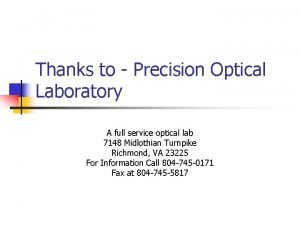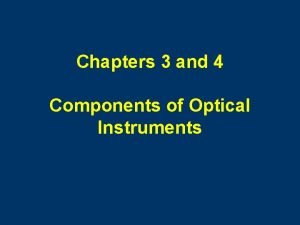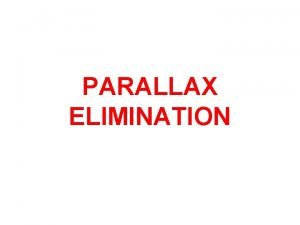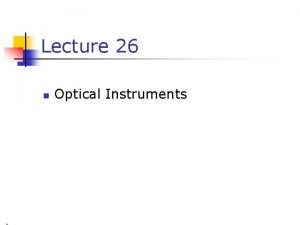PARALLAX ELIMINATION PARALLAX ELIMINATION In all optical instruments




- Slides: 4

PARALLAX ELIMINATION

PARALLAX ELIMINATION • In all optical instruments which have stadia hairs as a reference point for measuring a phenomena known as parallax must be eliminated • Parallax occurs when the image of the crosshairs is not focussed on the same vertical plane as the image of the staff. Therefore any slight movement of the viewers eye will appear to cause a movement between the stadia hair and the staff and hence lead to a different reading being seen • In order to avoid this error Parallax must be eliminated. This is done once the instrument has first been levelled. It is a process which depends on the focal length of the viewer eye and only needs to be done once.

PARALLAX Crosshair Diaphragm Eye piece focus ring EYE Image of Staff focussed at eye’s focal point Image of crosshairs Cross hairs not focussed at eye’s focal point Main focus ring NOTE: this is sometimes to be found on the side of the telescope body PARALLAX NOT REMOVED Crosshairs not as sharply focussed as could be. Apparent movement between images as eye is moved side to side

NO PARALLAX To remove parallax the following sequence of events need to occur: • Turn the telescope’s main focussing ring to infinity; there is no need to focus on any object. • Turn the telescope towards a light object (NOT THE SUN!). Failing this a piece of white paper in front of the telescope will suffice. • Whilst looking through the telescope turn the eyepiece focus ring until the crosshair appear as sharp as possible to YOUR EYE. The position of this will depend on the strength of your eyes. Note left and right eye may have different strengths. • In order to satisfy yourself that this is the sharpest image continue to turn the focussing ring until the image of the crosshairs are blurred then bring them back into sharp focus. • The crosshairs are now set on a plane dependant on your eye’s focal length. When you adjust the telescopes main focus the image of the staff will be in sharpest focus on this plane. Hence the two images will be coincident and parallax will have been eliminated. • Movement of your eye from side to side or up and down should not cause the reading of the staff to change. • If you wear spectacles it is a good idea to keep them on and adjust your eye position in relation to the telescope so you do not keep bumping into the eyepiece with your spectacles







